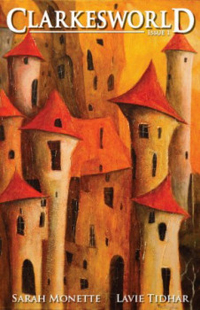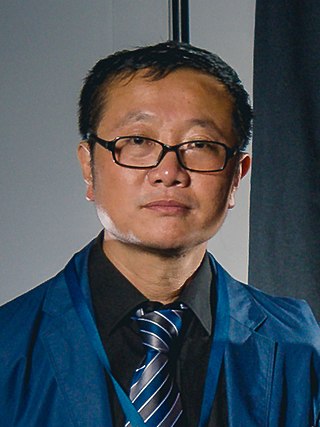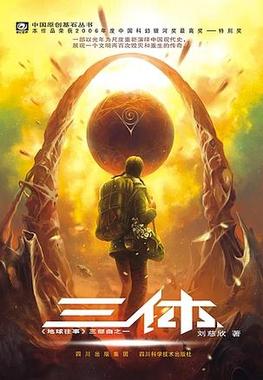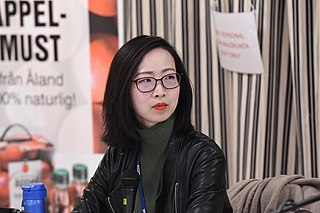
Kij Johnson is an American writer of fantasy. She is a faculty member at the University of Kansas.

Catherynne Morgan Valente is an American fiction writer, poet, and literary critic. For her speculative fiction novels she has won the annual James Tiptree, Jr. Award, Andre Norton Award, and Mythopoeic Award. Her short fiction has appeared in Clarkesworld Magazine, the anthologies Salon Fantastique and Paper Cities, and numerous "Year's Best" volumes. Her critical work has appeared in the International Journal of the Humanities as well as other essay collections.

Clarkesworld Magazine is an American online fantasy and science fiction magazine. It released its first issue October 1, 2006, and has maintained a regular monthly schedule since, publishing fiction by authors such as Elizabeth Bear, Kij Johnson, Caitlín R. Kiernan, Sarah Monette, Catherynne M. Valente, Jeff VanderMeer and Peter Watts.
Chinese science fiction is genre of literature that concerns itself with hypothetical future social and technological developments in the Sinosphere.
Neil Clarke is an American editor and publisher, mainly of science fiction and fantasy stories.

Aliette de Bodard is a French-American speculative fiction writer.
Will McIntosh is a science fiction and young adult author, a Hugo-Award-winner, and a winner or finalist for many other awards. Along with ten novels, including Defenders,Love Minus Eighty, and Burning Midnight, he has published dozens of short stories in magazines such as Asimov's Science Fiction, Strange Horizons, Lightspeed Magazine, Clarkesworld, and Interzone. His stories are frequently reprinted in different "Year's Best" anthologies.

Liu Cixin is a Chinese computer engineer and science fiction writer. He is a nine-time winner of China's Galaxy Award and has also received the 2015 Hugo Award for his novel The Three-Body Problem as well as the 2017 Locus Award for Death's End. He is also a winner of the Chinese Nebula Award. In English translations of his works, his name is given as Cixin Liu. He is a member of China Science Writers Association and the vice president of Shanxi Writers Association. He is sometimes called "Da Liu" by his fellow science fiction writers in China.

The Three-Body Problem is a 2008 novel by the Chinese science fiction author Liu Cixin. It is the first novel in the Remembrance of Earth's Past trilogy. The series portrays a fictional past, present, and future wherein Earth encounters an alien civilization from a nearby system of three Sun-like stars orbiting one another, a representative example of the three-body problem in orbital mechanics.
The Science Fiction & Fantasy Translation Awards was a literary award for science fiction and fantasy works translated into English. The first award was presented in 2011 for works published in 2010. Two awards were given, one for long form and one for short form. Both the author and translator receive a trophy and a cash prize of US$350. The award was supported a number of ways including direct donations from the public, the Speculative Literature Foundation, prominent academics in particular staff at the University of California, Riverside (UCR), home of the Eaton Collection, one of the world’s largest collections of science fiction and fantasy literature. The last award was for 2013, and the award officially closed in October 2014.

Ken Liu is an American author of science fiction and fantasy. Liu has won multiple Hugo and Nebula Awards for his novel translations and original short fiction, which has appeared in F&SF, Asimov's Science Fiction, Analog, Lightspeed, Clarkesworld, and multiple "Year's Best" anthologies.

Cheryl Morgan is a British science fiction critic and publisher. She has won Hugo Awards for her work on the fanzine Emerald City from 1995 to 2006, and as non-fiction editor of Clarkesworld magazine from 2009 to 2011. Morgan was the first openly trans person to win a Hugo Award, and she is currently the editor of the science fiction magazine Salon Futura.
This is a list of the published works of Aliette de Bodard.

Li Jun, known by the pen name Baoshu (宝树), is a Chinese science fiction and fantasy writer. One of his books, Three Body X, is a sequel to Death's End by Liu Cixin. Baoshu received his Master of Philosophy at Peking University, and a second master after studying at Katholieke Universiteit Leuven. In 2012 he became a full-time science fiction writer.
The Galaxy Award is China's most prestigious science fiction award, which was started in 1986 by the magazines Tree of Wisdom and Science Literature & Art. After Tree of Wisdom ceased publication soon afterwards, the award was organized solely by Science Literature & Art, which was renamed to Science Fiction World in 1991.

Chen Qiufan, also known as Stanley Chan, is a Chinese science fiction writer, columnist, and scriptwriter. His first novel was The Waste Tide (2013), which "combines realism with allegory to present the hybridity of humans and machines". Chen Qiufan's short fiction works have won three Galaxy Awards for Chinese Science Fiction and twelve Nebula Awards for Science Fiction and Fantasy in Chinese. "The Fish of Lijiang" received the Best Short Form Award for the 2012 Science Fiction & Fantasy Translation Awards. His stories have been published in Fantasy & Science Fiction, MIT Technology Review, Clarkesworld Magazine, Year's Best SF, Interzone, and Lightspeed, as well as influential Chinese science fiction magazine Science Fiction World. His works have been translated into German, French, Finnish, Korean, Czech, Italian, Japanese and Polish and other languages.
Tang Fei is the pen-name of Chinese science fiction writer Wang Jing. She mainly writes speculative novellas and short stories, and is a member of the Science Fiction and Fantasy Writers of America.

Regina Kanyu Wang is a Chinese writer of speculative fiction and essays on the genre. Her work was first published in 2015, and she immediately began earning acclaim in the form of a number of national awards. In 2023, she was nominated for two Hugo Awards, one for her work the prior year on the fanzine Journey Planet, and one for her 2022 short story 火星上的祝融. She writes in both Chinese and English.
Invisible Planets is a science-fiction anthology edited and translated by Ken Liu composed of thirteen short stories as well as three essays by different Chinese writers, namely Chen Qiufan, Xia Jia, Ma Boyong, Hao Jingfang, Tang Fei, Cheng Jingbo and Liu Cixin. It was published by Head of Zeus in March 2016. It contains the novelette "Folding Beijing", which won the Hugo Award for Best Novelette in 2016, which also marked the first time a Chinese woman has won the award.
Broken Stars is a science fiction anthology edited and translated by Ken Liu composed of sixteen short stories as well as three essays by different Chinese writers, namely Xia Jia, Liu Cixin, Tang Fei, Han Song, Cheng Jingbo, Baoshu, Hao Jingfang, Fei Dao, Zhang Ran, Anna Wu, Ma Boyong, Gu Shi, Regina Kanyu Wang and Chen Qiufan. It was published by Tor Books in April 2020.











